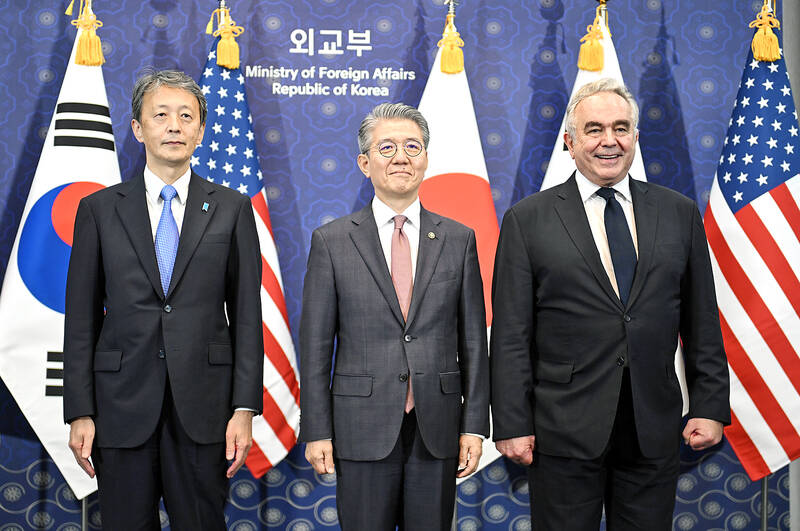Eleven countries, including South Korea, the US and Japan, are launching a new joint mechanism to monitor North Korea sanctions violations, the South Korean Ministry of Foreign Affairs said yesterday.
The decision follows Russia’s decision to veto the renewal of a panel of UN experts monitoring international sanctions on North Korea in March, effectively ending official oversight of sanctions imposed for the North’s banned nuclear and weapons programs. Russia’s veto was met with great criticism, with the US calling it a “self-interested effort to bury the panel’s reporting on its own collusion” with North Korea.
Since then, Seoul and other countries have been working to apply different methods to continue sanctions monitoring, with the US ambassador to the UN saying they are exploring “some creative ways” and “out-of-the-box thinking” to ensure the continuation of monitoring activities.

Photo: EPA-EFE
Alongside South Korea, the US and Japan, eight other countries — France, the UK, Germany, Italy, the Netherlands, Canada, Australia and New Zealand — are to participate in the multilateral sanctions monitoring team (MSMT).
The MSMT is “aligned in our commitment to uphold international peace and security and to safeguard the global non-proliferation regime and address the threat arising from [North Korea’s] weapons of mass destruction and ballistic missile programs,” the countries said in a joint statement.
The MSMT would “monitor and report violations and evasions of the sanction measures” of the UN Security Council resolutions, it said.
“Our preference would have been to continue the previous regime,” US Deputy Secretary of State Kurt Campbell said in a joint news conference in Seoul yesterday.
“That avenue was prevented by Russian intransigence, so this is the approach that we’ve taken,” he added.
“This grouping of nations that are animated by common purpose has the potential to actually surpass some of the work and reporting that was done previously,” Campbell said.

The Taiwanese passport ranked 33rd in a global listing of passports by convenience this month, rising three places from last month’s ranking, but matching its position in January last year. The Henley Passport Index, an international ranking of passports by the number of designations its holder can travel to without a visa, showed that the Taiwan passport enables holders to travel to 139 countries and territories without a visa. Singapore’s passport was ranked the most powerful with visa-free access to 192 destinations out of 227, according to the index published on Tuesday by UK-based migration investment consultancy firm Henley and Partners. Japan’s and

NATIONAL SECURITY THREAT: An official said that Guan Guan’s comments had gone beyond the threshold of free speech, as she advocated for the destruction of the ROC China-born media influencer Guan Guan’s (關關) residency permit has been revoked for repeatedly posting pro-China content that threatens national security, the National Immigration Agency said yesterday. Guan Guan has said many controversial things in her videos posted to Douyin (抖音), including “the red flag will soon be painted all over Taiwan” and “Taiwan is an inseparable part of China,” while expressing hope for expedited “reunification.” The agency received multiple reports alleging that Guan Guan had advocated for armed reunification last year. After investigating, the agency last month issued a notice requiring her to appear and account for her actions. Guan Guan appeared as required,

Japan and the Philippines yesterday signed a defense pact that would allow the tax-free provision of ammunition, fuel, food and other necessities when their forces stage joint training to boost deterrence against China’s growing aggression in the region and to bolster their preparation for natural disasters. Japan has faced increasing political, trade and security tensions with China, which was angered by Japanese Prime Minister Sanae Takaichi’s remark that a Chinese attack on Taiwan would be a survival-threatening situation for Japan, triggering a military response. Japan and the Philippines have also had separate territorial conflicts with Beijing in the East and South China

A strong cold air mass is expected to arrive tonight, bringing a change in weather and a drop in temperature, the Central Weather Administration (CWA) said. The coldest time would be early on Thursday morning, with temperatures in some areas dipping as low as 8°C, it said. Daytime highs yesterday were 22°C to 24°C in northern and eastern Taiwan, and about 25°C to 28°C in the central and southern regions, it said. However, nighttime lows would dip to about 15°C to 16°C in central and northern Taiwan as well as the northeast, and 17°C to 19°C elsewhere, it said. Tropical Storm Nokaen, currently